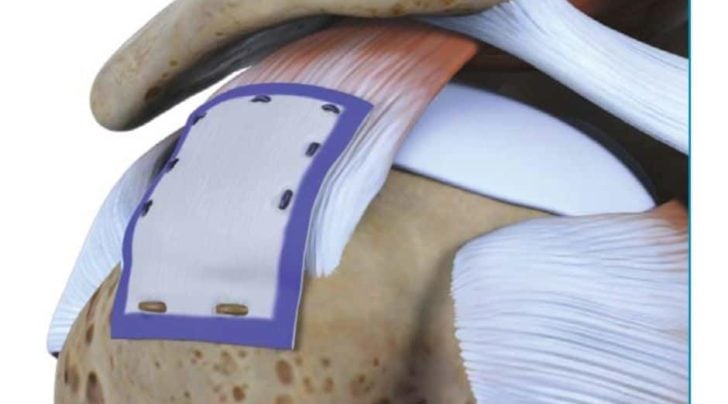
Rotator cuff tendinosis is a very common cause of shoulder pain in the adult population. By definition, rotator cuff tendinosis means that your rotator cuff tendons are starting to show their age. In other words, the rotator cuff is starting to degenerate or wear out. Most rotator cuff tears are due to this degeneration or wearing out of your rotator cuff tissue. Many people with rotator cuff tendinosis have severe pain at night. Until recently there were very few good surgical options for people with rotator cuff tendinosis. With a recent invention, surgery might be able to cure rotator cuff tendinosis. Before we review a promising new procedure to treat tendinosis, let’s consider the following.
There are many potential causes of your rotator cuff tendinosis:
- Age
- Genetics
- Overuse
- Various overhead activities
Most of you with rotator cuff tendinosis have severe pain on the side of your arm. Reaching into the back seat of your car is brutal. Rotator cuff tendinosis also causes severe night pain in the shoulder and can lead to many sleepless nights.
Once rotator cuff tendinosis is present and your rotator cuff begins to degenerate, the rotator cuff can go on to tear more easily. Initially, only a small portion of rotator cuff may separate from the bone. We will call that a partial thickness rotator cuff tear. As rotator cuff tendinosis progresses further, the rotator cuff tendon may continue to tear, thus leaving you with a full thickness rotator cuff tear. The graphic below shows the progression of rotator cuff tendinosis to a full rotator cuff tear.
 What Is The Treatment For Rotator Cuff Tendinosis?
What Is The Treatment For Rotator Cuff Tendinosis?
Initially, non-surgical management is started to address your pain and improve your quality of life. Many people with rotator cuff tendinosis can be successfully treated with:
- Physical Therapy
- Anti-inflammatory medications
- Activity modification and rest
- A cortisone or steroid injection
A small percentage of you will not improve with the these treatments. Your shoulder continues to hurt and your quality of life is poor. What other treatments can we offer you?
Can Surgery Cure Rotator Cuff Tendinosis?
Millions of patients suffer from rotator cuff tendinosis and a significantly affected quality of life. You’re not sleeping well, you have a hard time working and you can no longer play ball with your children.
Before the development of a recent patch to try and regenerate a degenerative rotator cuff our approach to the surgical management of rotator cuff disease was “mechanical”. That means that we put a camera into your shoulder and were able to remove the inflamed tissue or bursitis, and possibly any bone spurs that were present. The problem used to be that we couldn’t do anything to try and reverse or repair the tendinosis.
Rotator cuff tendinosis is truly a disease, it is a BIOLOGICAL problem. Our rotator cuff tissue is degenerating; and nothing we did previously addressed the underlying change in the biology of the tendon. By removing the inflamed tissue, we simply dealt with the effects of the tendinosis, and not the tendinosis itself. That is why surgery to remove bone spurs and inflammatory tissue alone had mixed results.
This new procedure enables us to arthroscopically (minimally invasive) place a “bioinductive” patch over the area of rotator cuff tendinosis or even a partial rotator cuff tear. The research shows that over time the patch can regenerate the rotator cuff tendon. We finally have a BIOLOGICAL means of treating your shoulder pain. Some early research shows the patch is healing degenerative rotator cuff partial tears and tendinosis.
How Does The Rotator Cuff Patch Work?
Once that patch is in position on the rotator cuff it begins to “induce” the rotator cuff to repair or regenerate itself. This has been shown to lead to healing of partial thickness rotator cuff tears, and potentially reverse the degenerative changes. For those of you with rotator cuff tendinosis, but no tear — it is possible that this bioinductive patch could prevent your rotator cuff from degenerating further into a situation where you now have a partial rotator cuff tear.
The graphic below shows that patch in place and the healing of the tendinosis and a partial rotator cuff tear.
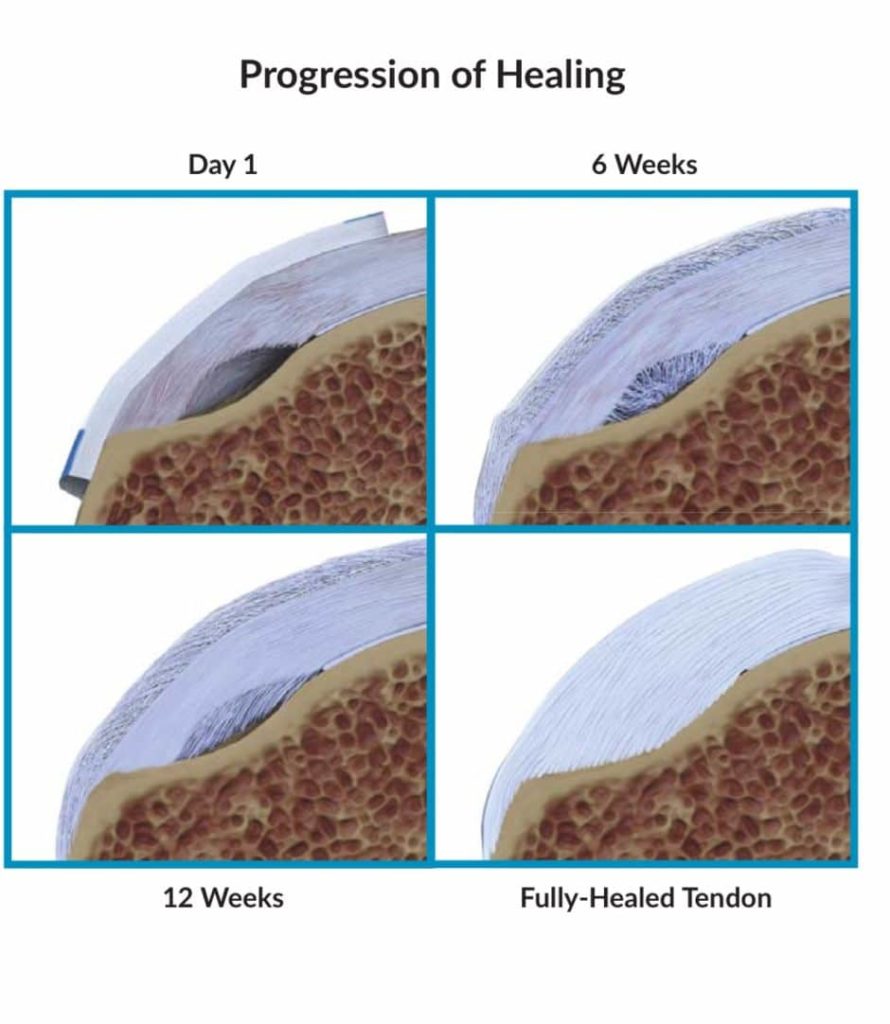
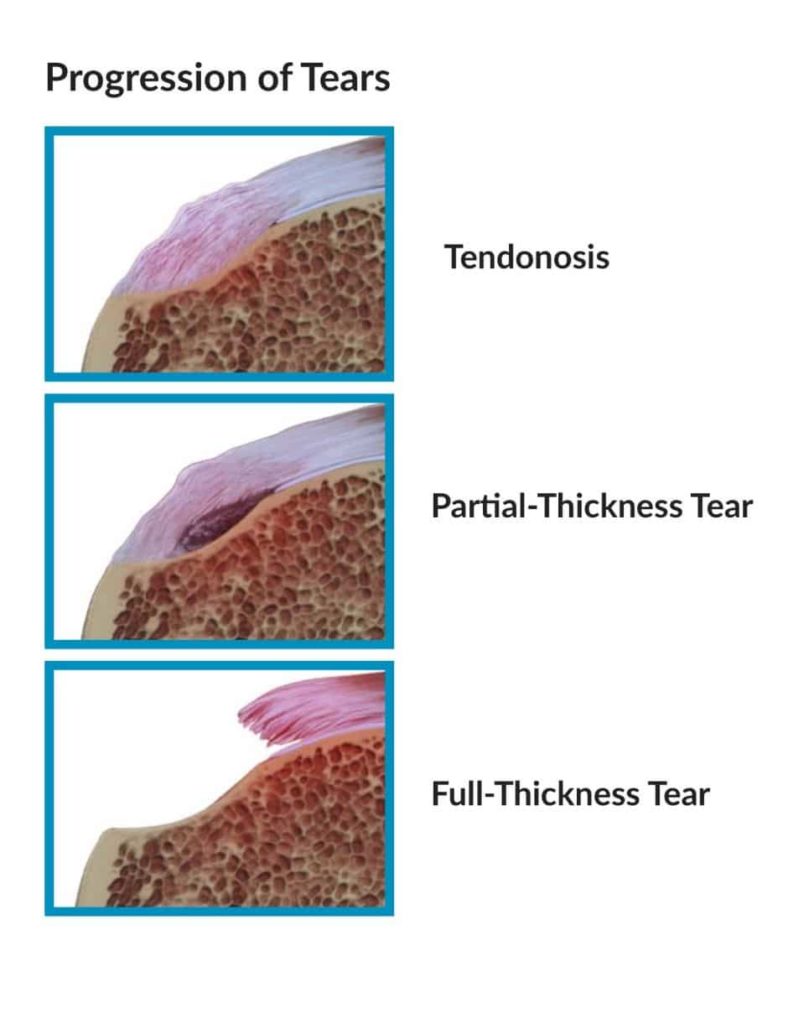
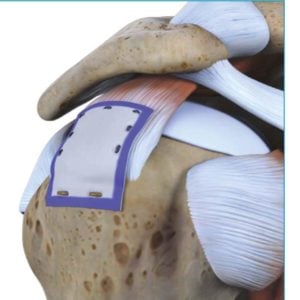


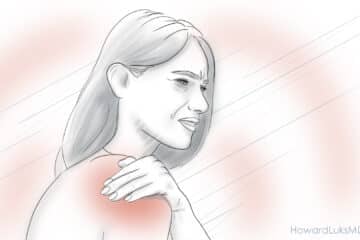

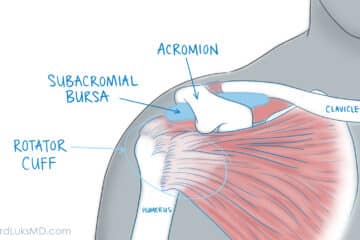
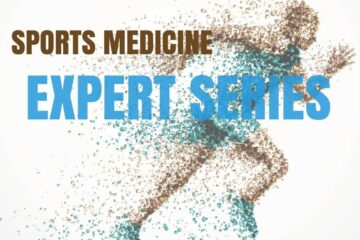




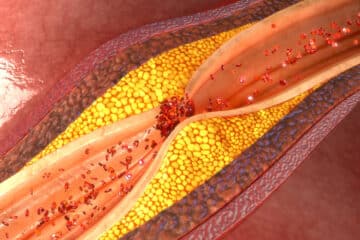

I really learned a lot in this article. I am 62 and started having rt shoulder pain. Had a cortisone injection which did nothing. The pain and ROM worsened. I had an MRI with Moderate rotator cuff tendinitis with undersurface fraying and partial tear in of the distal supraspinatus tendon. A linear signal alteration in the intra articulated long head of bicep tendon, glenohumeral joint effusion with Synovitis. AC joint hypertrophy and a prominent inferiors directed osteopath. Yikes. Very painful with movement. Are there other options other than surgery? Might the patch be appropriate in this situation? Thank you
Only after a thorough evaluation and exam could I tell you if I thought the patch would be useful.
Sorry… hope you feel better.
Great great article! Would like to know if I should continue my daily upper body strength exercises (I’m 88 years old) as I deal with the shoulder/arm pain? Thank you for your response.
I’m now 59 yo, male, very active and in good shape. I’m scheduled for surgery to fix rt supra cuff that was repaired 20 yrs ago (traditional open fix for large tear due to fall on wet floor) and has been trouble-free up to this latest tear. Can tendonosis be seen on MRI/arthrogam & ultrasound scans? I mentioned that maybe tendonosis was setting in that caused this latest tear, but Dr. did not mention that when he read my MRI. Or, will he only be able to see it when he goes in and then discovers my tendon repair will require a patch due to bad tendon integrity? tx.
HI…
Many rotator cuff repairs will degenerate over time and lead to another tear. These recurrent tears are not uncommon. Many are due to tendinosis once we reach middle age. The MRI should reveal changes consistent with rotator cuff tendinosis.
At the time of arthroscopy we are also able to tell by simply looking at the quality of the tendon. In most institutions the patch needs to be ordered in ahead of time. There are different patches available for different situations. The results of revision rotator cuff repairs is not as good as the results of the repair of the initial tear. Therefore many of us prefer to have some form of patch augment available just in case.
11 days ago I hurt myself in a very weird way when I was reaching for something at shoulder height and I suddenly snapped arm back because I was startled to see a spider. Now right arm is very limited in range of motion. Can barely move arm up only somewhat close to my body. Hurts especially in front part of the deltoid. I’m trying to avoid surgery but looks like healing time will be much longer than I thought originally. If at all possible. At first, I had more expectation of better outcome because I’ve usually been a good healer but not sure now . I’ve gotten a lil better but will see doctor on another matter and tell her about it.
Shoulder strains, and in particular strains of the rotator cuff can take weeks to months to improve. Shoulder surgery can be an even more lengthy recovery.
Thank you so much for your articles on rotator cuff surgery. You’ve explained in plain English everything necessary for a patient to know and understand. I feel validated for choosing surgery after two years of waking up from intense shoulder pain. I’ve done two rounds of physical therapy, one Cortisone injection, and countless acupuncture, massages, meditation, And even journaling. I was lucky to find a doctor who has experience with biological patches. One of the doctors I consulted simply wanted to remove the bursa. I was wondering what your view is of biceps tendoniesis surgery as an adjunct to rotator cuff surgery. Thanks!!
HI Liz… The biceps can be a troublemaker in many shoulders. I do not routinely tenodese the biceps in all shoulders, but if I think that it has a role in your pain, or if your imaging shows degeneration, a split tear or narrowing around the biceps then I will usually perform a tenodesis. If I find the biceps is unstable due to ligament injuries around the “rotator interval” at the time of arthroscopy, I will also tenodese the biceps.